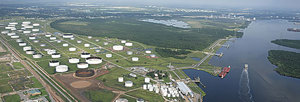Philadelphia refiners face run cuts due to Sunoco pipeline shutdown
NEW YORK (Reuters) -- Philadelphia area refiners may be forced to cut production in coming months because Energy Transfer Partner LP's Sunoco Logistics is temporarily shutting down a key pipeline that carries refined products into central Pennsylvania, two sources told Reuters.
Sunoco Logistics informed shippers last week that it was shutting down a 12-in. pipeline that runs from two terminals in the eastern part of the state to Reading, Pennsylvania, area, according to a shipping notice seen by Reuters. The line will be shut on June 15 for six to 10 months to deal with integrity issues and increase capacity, the notice said.
Sunoco is putting in place an alternative route using a smaller pipeline, the notice said, without providing any specifics.
Sunoco did not say whether the alternative shipping method allowed for similar volumes and whether the central part of the state should prepare for price spikes. A spokesman said that they expect to be able to work with "shippers and Philadelphia-area refineries to accommodate their needs."
The pipeline, known locally as the APL pipeline, is used primarily by refiners Philadelphia Energy Solutions Inc (PES) and Monroe Energy, a subsidiary of Delta Air Lines Inc. Sunoco owns a stake in PES.
The temporary loss of the pipeline will likely lead to run cuts, particularly in gasoline, since the plants lack spare capacity to park products.
"They need to pump it out and be done with it," a product trader said.
PES and Monroe Energy declined to comment.
The shutdown comes at the start of the critical summer driving season, when margins are typically the healthiest. The PES and Monroe refineries have been struggling with weak margins ever since the wide discount on railing in domestic crude vanished in late 2015.
It is unclear how much volumes moved on the Sunoco pipeline and the potential size of the production cuts, but one source said gasoline volumes were more than 50,000 bpd.
“If there’s product moving on that pipeline now, that’s because it’s the most cost-effective way to move it. If the pipeline is inoperable, and there’s no suitable substitute, then the shipper will have to pay a higher cost to move the barrels,” said Ernie Barsamian, chief executive officer and principal of the Tank Tiger, a terminal storage clearinghouse.
Reporting by Jarrett Renshaw; Editing by Lisa Shumaker







Comments